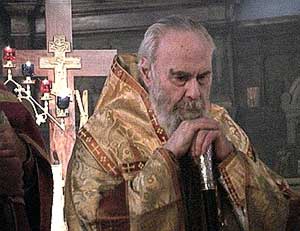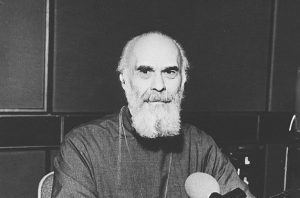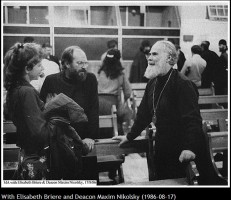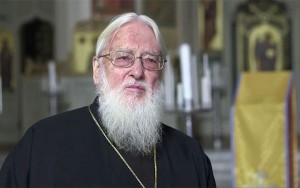 Every day at Evening Prayers, we say those words written centuries ago by St. John Chrysostom, asking the Lord to forgive us our sins and to make a good beginning. Each day, when the day is at an end and we are going to sleep, which is so like unto death, when we are no longer in control of ourselves but find ourselves under God’s mercy, in his hands, we say “Lord, remit us our sins, grant us to begin a new life when, as with Lazarus, You bring us out into a new day, into a new life.” This perhaps is especially pertinent to those who had spent their entire day in repentance, those who stood the entire day facing their implacable conscience and God, Who calls us to salvation and Who was Resurrected before us, but Who still carries on His risen Flesh the marks of His Crucifixion. It was a Crucifixion He endured because of the sins of mankind, wounds that will remain on His Most-pure Flesh, unhealed, as long as even one of us remains a sinner, i.e., remains guilty of His Crucifixion, remains an active crucifier of Christ. Each of us must think about how he has spent the day—simply put, did he consider his life, or did he rend the curtain that separates our repentant consciousness from the depths of our life?
Every day at Evening Prayers, we say those words written centuries ago by St. John Chrysostom, asking the Lord to forgive us our sins and to make a good beginning. Each day, when the day is at an end and we are going to sleep, which is so like unto death, when we are no longer in control of ourselves but find ourselves under God’s mercy, in his hands, we say “Lord, remit us our sins, grant us to begin a new life when, as with Lazarus, You bring us out into a new day, into a new life.” This perhaps is especially pertinent to those who had spent their entire day in repentance, those who stood the entire day facing their implacable conscience and God, Who calls us to salvation and Who was Resurrected before us, but Who still carries on His risen Flesh the marks of His Crucifixion. It was a Crucifixion He endured because of the sins of mankind, wounds that will remain on His Most-pure Flesh, unhealed, as long as even one of us remains a sinner, i.e., remains guilty of His Crucifixion, remains an active crucifier of Christ. Each of us must think about how he has spent the day—simply put, did he consider his life, or did he rend the curtain that separates our repentant consciousness from the depths of our life?
Our sinfulness begins in the very earliest days of our existence, and manifests itself throughout our life in a wide variety of ways consistent with one’s age and the condition of his soul. What should have happened is that everyone who prepared for Confession yesterday reflected so profoundly on his life that everything dark and unworthy came out in the open—what was in himself, in his love for the others who had given him their hearts, and in his love for God, a gift whose price was death on the Cross. Is that how we spent yesterday? In profound reflection, in such intense soul-rending contemplation of how we have betrayed ourselves, the trust our parents and our relatives had in us, and ultimately the trust God granted us at our creation, with the belief that it was not a futile endeavor, that we would receive His gift of life as something holy, and would not sully it—or if we did sully it, through repentance would return, or more precisely, would move even farther along the path to salvation. Re-read the Epistle which was read last Sunday, re-read the Epistle that was proclaimed today, and think about them. To repent means to begin a new life, to renounce the past with great resolve, with strength of will. However attracted to evil we might be, we must be ready to say: No, no matter what the cost, I will not sin, will not allow these thoughts, will not allow these feelings and emotions to work within me.
Repentance is a turning point, a beginning in life. Those of you who repented and confessed, those who confessed today, those who dared Commune of the Holy Gifts, all of us, must make a good beginning, must begin a new life this very day. Not tomorrow, not later, but immediately, we must take up the new life worthy of our calling, for we are called to belong to Christ, not only to be, as He said, His brothers and sisters, but through Communion to become participants, participants in His physical incarnation, in His human mind and feeling, and beyond that, in His Divinity. Let us reflect upon this and make a good beginning. To the extent possible, let us repent not only on the day we prepare for Communion, not only on the day on which we go to Confession, but day in and day out, each evening, while we read those prayers of St. John Chrysostom. And as for daytime: the new day dawns, and the Lord resurrects us like Lazarus, saying to us: come out of your sleep and begin a new life in a new day, one which has never been before. Then let us make every effort to ensure that our repentance was not merely empty words, but the beginning of life, a promise to God that what is past will not happen again. Of course, we are not referring to everything that happened in the past, but everything that we have admitted, everything against which we promised in Confession to struggle, when we said, “That is evil, and I renounce it.” Renunciation is not for a minute, it is something lifelong. Through repentance, life is given to us by God, a life so full, so joyous, such a miracle of communion with God through our return, like the Prodigal Son, to our Father’s House.



















